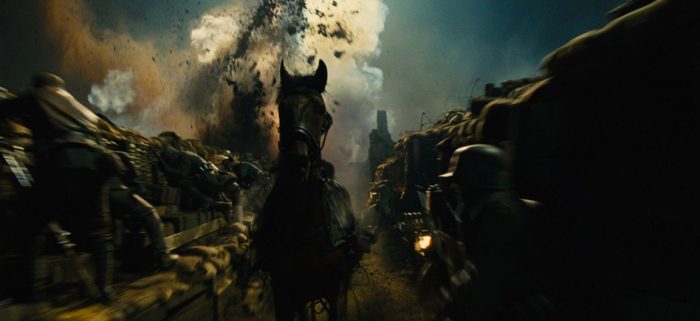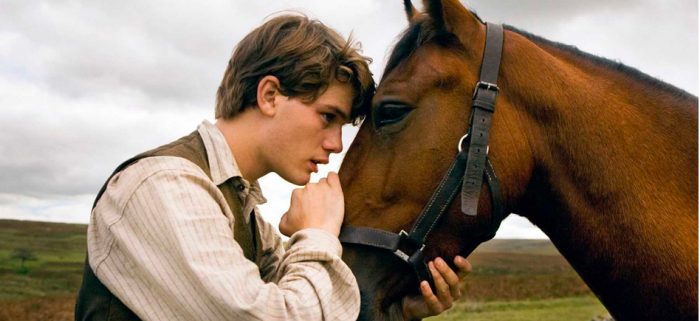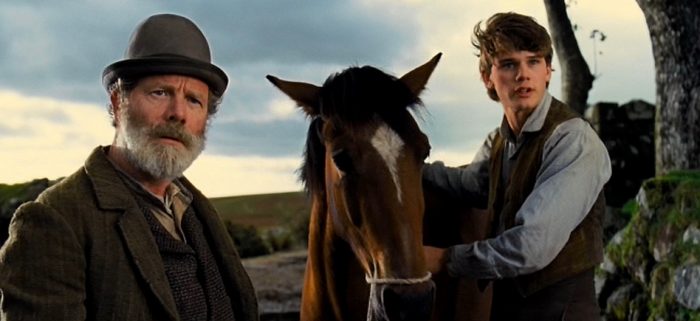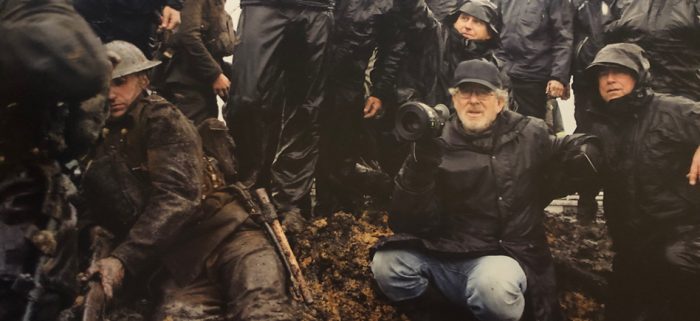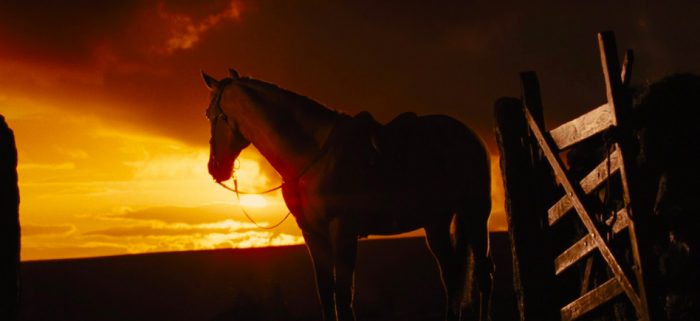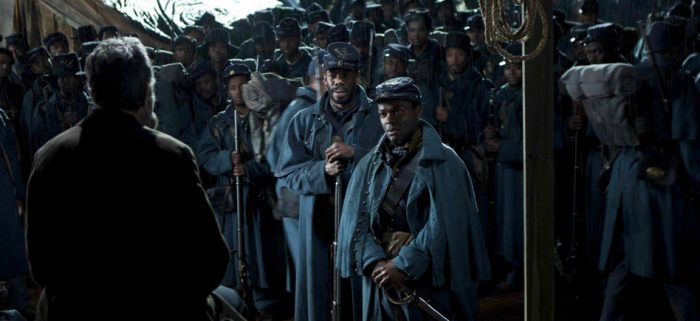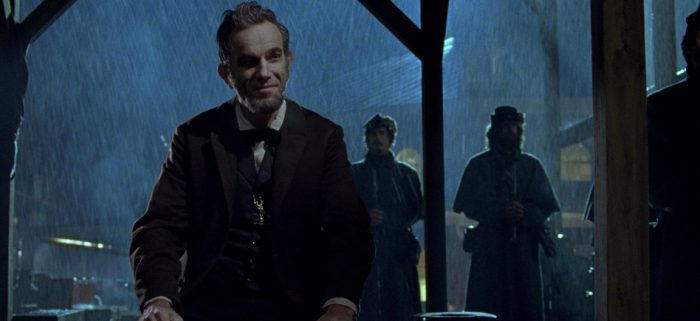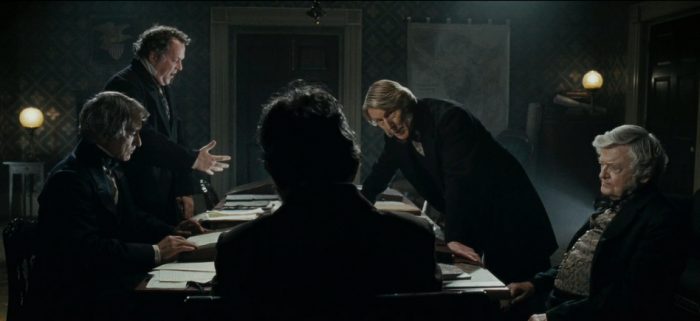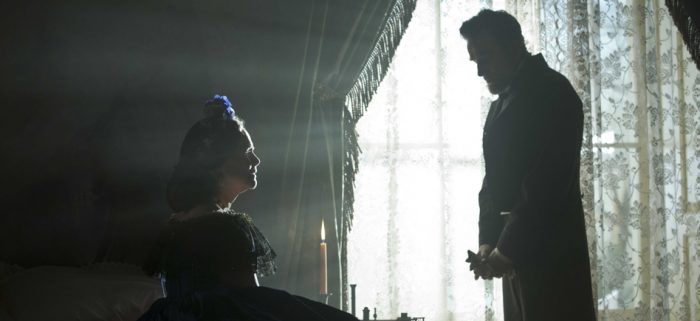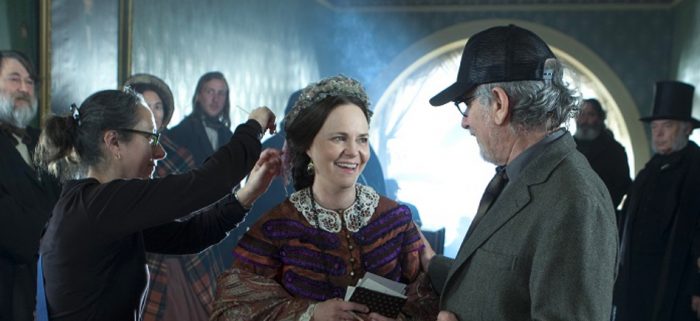21st Century Spielberg Podcast: With 'War Horse' And 'Lincoln', Steven Spielberg Looked For Compassion During Wartime
(Welcome to 21st Century Spielberg, an ongoing column and podcast that examines the challenging, sometimes misunderstood 21st-century filmography of one of our greatest living filmmakers, Steven Spielberg. In this edition: War Horse and Lincoln.)
War is hell. Any sane individual knows this and knows that the old romanticized notions of glory on the battlefield are little more than fantasy. But that hasn't stopped Hollywood from returning, again and again, to depicting big, loud, action-packed battles on the screen. Whenever reviewing a war movie, Roger Ebert was fond of pulling out a quote attributed to Francois Truffaut, that it was impossible to make an anti-war film because movies made war inherently entertaining. The real quote, as close as I can tell from my own research, comes from a 1973 interview Truffaut gave with Ebert's colleague Gene Siskel, in which the legendary French filmmaker said: "I find that violence is very ambiguous in movies. For example, some films claim to be antiwar, but I don't think I've really seen an anti-war film. Every film about war ends up being pro-war."
Steven Spielberg is no stranger to war movies. From Saving Private Ryan to the Band of Brothers miniseries, and beyond, Spielberg has portrayed war and all its horrors, but even when portraying the harrowing battles of Ryan, the truth of the Truffaut quote sneaks in: sure, war is hell, but it's also pretty entertaining in the hands of a master filmmaker. The real way to hammer home the horrors of war isn't so much to portray extended battle sequences. Instead, the secret is to move beyond the bullets and the blood and find the humanity lurking beneath; humanity in danger of being snuffed out like a candle in a cold wind. And with War Horse and Lincoln, two films focused on World War I and The American Civil War, respectively, Spielberg did just that.
Remarkable Humanity
Full of battles likened to slaughterhouses and meat-grinders, World War I, the Great War, the War to End All Wars, claimed nine million combatant deaths and 13 million civilian deaths during its long four-plus bloody years. And then there were the non-human deaths. "I was not prepared for how many millions of horses perished during the Great War – it was over 4 million," said Steven Spielberg. "And it wasn't all in close combat; a lot was just through malnutrition and mistreatment. But don't forget that the Humane Society was born out of the First World War, and it was a huge turning point in technological warfare that supplanted the horse once and forever."
Other statistics state eight million horses and countless mules and donkeys died during the war as the beasts of burden were used to transport ammunition and supplies to the front, dying from battles, weather, and other horrific conditions. We, as a species, are inherently cruel to animals. We claim dominion over them, and therefore believe we have the right to do whatever we want to them. And during World War I, horses were thrust into horrible savagery they had no control over. Men make war – animals suffer because of it.
When the war began in 1914, there were 25,000 horses in the British army. The War Office increased that number to 500,000. By war's end, the older horses who had served their human masters were killed while younger horses were sold for meat.
After speaking with a World War I veteran, novelist Michael Morpurgo struck upon the idea of telling a story about the horrors of the Great War through the point-of-view of a horse – a horse named Joey. "Joey gave me a voice that was beyond patriotism," Morpurgo said. "His was a gentle, compassionate voice that spoke on behalf of all conscripts everywhere."
The novel, War Horse, was published in 1982, and would eventually go on to be adapted for the stage in 2007. By 2009, the play had attracted the attention of Steven Spielberg after longtime producing partner Kathleen Kennedy mentioned the West End adaptation. Spielberg had just finished motion-capture work on The Adventures of Tintin, and was now forced to wait a full year for the animation to be completed. Ever the workaholic, Spielberg was already looking for a new project to pass the time, and as fate would have it, no one had yet to snap-up the movie rights to War Horse. The end result would be a film adaptation featuring 5,800 extras and 300 horses, shot during a relatively quick 63 days with a small (for Spielberg) $70 million budget.
And what a lovely film it is. Shrugged off by some as being far too sentimental, sappy, or old-fashioned, War Horse is Spielberg firing on all cylinders, crafting an unapologetically sincere, uncynical, kind-hearted film. "Despite...the horrors of war and the shattering of their innocence our heroes encounter on their journey to be reunited, this film is not about who is right in war," Spielberg said. "It is about the remarkable humanity that an animal is able to bring to these characters – be they English, German, or French."
The Best of Us
War Horse is Spielberg's most episodic film. It's almost an anthology piece; a work of several smaller tales with a wraparound set-up tying it all together. There aren't really any main human characters, not even Albert (Jeremy Irvine), the young English boy who raises Joey the horse and first realizes the animal's potential. Joey is our main character, a silent witness to multiple sides of the war, and our guide. We follow him through peace, and war, and peace again. Through the loving warmth of home to the hellish terrain of battlefields.
Starting in 1912, we meet Thoroughbred Joey in Devon, England, where frequently drunk farmer Ted Narracott (Peter Mullan) spends more money than he has in order to win the horse at auction. The Narracott family needs a plow horse, but Narracott sees something in the Thoroughbred. He's also seized with an urge to one-up his landlord Lyons (David Thewlis), who was also bidding on the horse.
It seems like a big mistake from the start, as Joey has no interest in, or understanding of, how to plow the farm. Things seem so dire, in fact, that Ted is ready to give up on Joey completely. But Ted's kind-hearted son Albert steps in and personally teaches the horse to plow, much to the amusement, and then approval, of the locals. These early scenes set the tone for War Horse, with Albert frequently offering encouragement to Joey while Albert's mother Rose (Emily Watson) looks on approvingly and Ted scowls. The Spielbergian poor father-son relationship theme returns yet again, but Ted is not a villain. He's just a broken, melancholy man, wounded both physically and mentally from his time in the Second Boer War. He is not a cruel man – but he doesn't know how to be kind, either.
Joey is an expressive animal, and on more than one occasion, his reactions and actions are played for laughs – such as when he intentionally halts from jumping over a wall while Albert is trying to impress a local girl, sending Albert flying into the mud. But War Horse never fully anthropomorphizes the animal. This isn't an animated Disney film with a talking beast. The furthest it's willing to go is to treat Joey like a faithful dog occasionally – although at one point a character snaps, "That's enough! It's a horse, not a dog!"
But the bond between Joey and Albert is unmissable. It's strong and warm, and unabashedly tender. "I knew when I first saw you that you'd be the best of us," Albert tells Joey. Albert cares for the horse as if it were a member of his own family. Indeed, he shows more love for Joey than he does his father. Which makes his father's next betrayal all the more heartbreaking: even though Joey is able to plow the fields, poor weather destroys the crops, and with war looming, and the family in dire need of money, Ted sells Joey off to the British Army.
The parting between beast and boy is undeniably heartbreaking, and Spielberg and screenwriters Lee Hall and Richard Curtis soften the blow with how the animal changes hands. Albert arrives too late to stop the sale but finds comfort in the horse's new owner, Captain James Nicholls (Tom Hiddleston), who appears to be cut from the same unashamedly kind cloth as Albert. Nicholls promises to take the best of care of Joey, and even promises – if possible – to bring the horse back to Albert one day. This could simply be seen as a sweet, but empty, gesture. Our knee-jerk reaction is to assume that Nicholls is merely pouring honey in Albert's ear to ease his pain, and that he doesn't have any intention of being such a humane individual.
A Love Story
Nicholls isn't just telling Albert a tale – he really means what he says. Later, we see Nicholls painstakingly drawing a picture of Joey with the intention of mailing it, along with a letter, back to Albert. Nicholls is the first of several soldiers who defy expectations. All throughout War Horse, Spielberg is searching for a spark of humanity.
"The bones of the story, it's a love story," Spielberg said. "It's a bonding story, where Joey basically circumvents the emotional globe of the great war and he gets very connected with the people who are caring for Joey. More importantly, Joey has a way of relating to people from both sides of the war."
There aren't many outwardly cruel humans in the film, but there are also individuals like Nicholls who stand out. Nicholls' superior officer Major Jamie Stewart (Benedict Cumberbatch) seems like a nice enough fellow, but he's also more interested in soldiering and thinks of his own horse – Topthorn – as little more than an object of war. But Nicholls cares for Joey, which makes Nicholls' death all the more heartbreaking.
In one of the film's many stupendous set-pieces, Spielberg films a battle charge with British cavalry through a German encampment that ends in disaster. The Germans are able to retreat to a cache of strategically placed machine guns and open fire. Rather than showing Nicholls, and other men, brutally obliterated with a hail of bullets, Spielberg cuts from a shot of the British men on horses to behind the German line, with the guns firing, and the now riderless horses galloping on by. We never see Nicholls fall, but his fate is unmistakable.
And with Nicholls dead, Joey moves on. He's herded into the German army along with Topthorn, who becomes his side-kick. The two horses end up being whisked away by two very young German soldiers trying to avoid battle. Like Nicholls, these characters are also oddly humane individuals in an inhumane situation, and their desertion leads to their execution in yet another brilliant set-piece – the boys stand beneath a windmill with ripped sails, and just as they're about to be gunned down by firing squad, one of the slowly spinning blades block our view. Like with Nicholls' death, Spielberg is showing us the horrors and mortality of war without actually showing us anything. But it's not a cop-out. Indeed, the deaths feel all the more heartwrenching when portrayed in such abstract ways.
From here, Joey finds himself on a French farm with Topthorn, raised by a kindly farmer and his granddaughter. It's a brief moment of peace and tranquility, but it doesn't last, and before long, Joey and Topthorn are pulling heavy artillery up muddy fields while men, and horses, die in agony around them. It leads to one of the most heartbreaking moments in a film filled with them: Topthorn succumbing to the conditions, dying as a German Private Henglemann – another of those uncommonly kind people – tries fruitlessly to help. The film hasn't shied away from the darkness and horrors of war so far, but these sequences take things even further, bombarding the viewer with scenes set in murky, sinking mud and blasted wastelands, where the sky hanging overhead is the color of a corpse. And then Spielberg moves into the trenches.
A Human Narrative
Trenches are most often associated with World War I, and they were, without question, hellish locations. Pits in the earth full of muck and mire, rodents, and vermin. The constant exposure to cold, wet weather led to trench foot and trench mouth. And then there was shellshock, something that had never been diagnosed in war before. Today we'd call it PTSD, but back in World War I, there was a mystery about it – a sense that just being near the force of shellfire had somehow dislodged a man's very sanity. Things would grow so dire in trenches that men would literally drown buried beneath decaying flesh and mud.
But as he's done through most of the film, Spielberg doesn't zero in on one particular horror. He just gives us a general idea of what's there, and it's effective in its subtly. Then, in true anthology movie fashion, the narrative comes right back around to where it started. In the years since he parted ways with Joey, Albert has joined up with the army, and is now deep in the trenches as the muddy, bloody, barbed-wire no man's land looms large and deadly. Albert ends up partially blinded by a gas attack, and not too far away from where this happens, an injury befalls Joey, too. Fleeing from the Germans, he ends up caught in barbed wire, giving way to a scene of pure poetry.
Calling a momentary truce, a British and German soldier both head out into no man's land to help the wounded animal. Such a truce isn't a work of fantasy – in 1914 the war saw the so-called Christmas Truce, wherein German and British soldiers left the trenches to exchange food, holiday greetings, prisoners, and even, in some cases, play football.
Freed but wounded, Joey's fate seems in doubt. The British soldier who helped free him (Toby Kebbell) begs an army doctor to treat the horse's wounds, but the doctor is aghast. He scoffs at the idea – he has human soldiers to treat, and it would be best for the animal to just be put down. But wouldn't you know it – Albert is in the area as well, recovering from the gas attack. And fate once again brings them together, reuniting horse and man. It's tender, it's sweet, and sure, it's manipulative – John Williams' swelling, heart-stirring score is meticulously designed to make you sob. But movies are a manipulative art form, and if we cannot allow ourselves to be manipulated to feel warmth and goodness from time to time, what the hell are we even doing here?
"I don't consider War Horse to be a movie about war," Spielberg said. "The war is a backdrop. It provides the necessary drama to pull these characters apart and eventually reunite them. This is a human narrative. It's about the connectivity that an animal can bring to human characters. It's really much more of a story about the hope that actually can exist in extremely dark circumstances because hope is always in Joey's face."
The war ends, and Albert and Joey are eventually reunited for good – Spielberg stages one last moment of heart-panging manipulation by making it look as if Albert is going to lose Joey in an auction, only to end up with the horse in the end. And man and horse return home to the farm, with Spielberg and cinematographer Janusz Kaminski pulling back the camera so that the sky is large and full of brilliant, burning colors. Albert reunites with his parents and embraces his father, and Joey looks off towards the sunset, at peace at last. I dare you not to cry.
A Creature Like This
Even if you want to shrug-off the sappy earnestness of War Horse (and you shouldn't), the film stands tall in Spielberg's body of work thanks to the pure showmanship on hand. All of that emotion wouldn't resonate nearly as well if Spielberg didn't go all-in on staging one big set-piece after another, be it that machine gun sequence, the execution of the two boys by the windmill, or a lengthy sequence in which Joey gallops among the bombs and bullets of no man's land (this is one of two specific moments where Spielberg didn't rely on a real horse, using CGI instead; the other is the barbed wire sequence, which has an animatronic animal; all other scenes use real horses).
Spielberg also got some help from pal Peter Jackson, who has an impressive collection of World War I memorabilia. "He's even got about 15 working biplanes, which we didn't need," Spielberg said "He sent about three cargo containers to the U.K., free of charge. He pretty much lent me his entire World War I collection."
War Horse is Spielberg in John Ford mode and paying tribute to the films he grew up with. The big, sweeping, old-fashioned epics. "For this movie, we talked about certain visuals," Kaminski said. "We spoke about John Ford and his composition and about the importance of the characters standing out from the land rather than blending in. The movie takes place in an amazing English landscape so I used many very big, very strong lights because I wanted to see the blue skies and puffy clouds and I wanted the characters to stand out from the land."War Horse is a film with big landscapes and bigger emotions. The type of movie where people stand in the rain, hair plastered to their face, and flash knowing looks of awe and happiness as the camera pushes in; where the skies are always wide-open, and the sunsets look like a painting – or maybe a shot taken from Gone with the Wind, although Kaminski swears that was unintentional. "I didn't even know there was an image similar to that [in Gone With the Wind]!" the cinematographer said. "It just felt right, that this boy coming back from his journey as a man deserves to be treated in a very heroic way, and the composition reflected that."
But beyond the stunning filmmaking, Spielberg is selling us a film about hope. A film that looks to find kindness in the unkindest of places, a philosophy lifted directly from Michael Morpurgo's novel. "Does he not personify all that men try to be and never can be?" Morpurgo wrote. "I tell you, my friend, there's divinity in a horse, and especially in a horse like this. God got it right the day he created them. And to find a horse like this in the middle of this filthy abomination of a war, is for me like finding a butterfly on a dung heap. We don't belong in the same universe as a creature like this."
The Lincoln Project
America loves to mythologize its great leaders of the past. But none seem to loom as large as Abraham Lincoln. Even George Washington seems rather boring in comparison. Lincoln's legend feels like something we're born with; we spring forth from the womb already fully aware of his legacy. Lincoln the bumpkin, the lawyer, the brawler, the president, the martyr. The boy who grew up in a log cabin, teaching himself to read. Who grew into a man with immense physical strength and a mind plagued with crushing depression. The man who oversaw the country brutally splitting apart and then violently pieced it back together – and died for all his troubles. Abraham Lincoln isn't a man. He's a saint. A gleaming, well-polished marble bust. A 99-foot seated behemoth who looks out at us all from the cool shadows of his sprawling, elevated monument. How do you even begin to make a man like that seem human? If you're writer Doris Kearns Goodwin, you go to unlikely sources: his political rivals.
Goodwin's book Team of Rivals tells Lincoln's story, in part, via the men who all vied for nomination at the Republican National Convention alongside him – William H. Seward, Salmon P. Chase, Edward Bates. Men who were furious when Lincoln won the nomination, only to then go on to join his cabinet (and in the case of Seward, become a good friend). Goodwin originally intended to write a book about the relationship between Lincoln and wife Mary Todd, but in doing her research, she realized that the great man seemed more married to his "team of rivals," and those men kept diaries and letters about Lincoln. Here was a fresh way to view Lincoln through intimate eyes.
And when it came time to make a movie about Abraham Lincoln, it was Goodwin's book Steven Spielberg would look to. But he would also look to Tony Kushner, the playwright who had scripted Spielberg's Munich. And he would also turn to Daniel Day-Lewis, a renowned actor known for committing fully and completely to whatever role he happens to play. With these tricks up his sleeve, Steven Spielberg would try to do the impossible: make Abraham Lincoln seem human again. "You get to spend time with Lincoln as a human being, not just as a statue or a $5 bill tucked away in your pocket," Spielberg said. "The idea was to flesh him out."
But how?
Finding Lincoln
Like War Horse, Lincoln uses war as a backdrop. As the film opens, it's 1865, and the Civil War has raged for four years. The deadliest war in American history, it would claim 620,000 to 750,000 soldiers along with an undetermined number of civilians, and overseeing it all was Abraham Lincoln. But before Spielberg introduces us to the 16th President of the United States he takes us into battle – to the Battle of Jenkins' Ferry, where Black Union soldiers clash violently with confederates.
This is not a well-staged, well-choreographed battle scene. It's chaos and brutality as the battling men hack and slash at each other, struggling, punching, kicking. Confederates are drowned in watery sludge. Remember: war is hell, and so much of the Lincoln presidency was writ in bloodshed. The Black Union soldiers triumph, and, in sheets of rain, they talk with a figure bathed in shadow, his back to us. One of the Black soldiers (Colman Domingo) is in awe of the man to whom they speak, while another (David Oyelowo) does not hesitate to voice displeasure at how Black soldiers are treated as inferiors to their white counterparts. The man they're talking to, of course, is Abraham Lincoln (Daniel Day-Lewis), and he's kind and accomodating – but also noncommital to the Black soldier's complaints. Here, Spielberg and Kushner are immediately setting the stage, showing us that the man who is credited with freeing the slaves has a complicated legacy from the start.
To start a movie about Abraham Lincoln in 1865, the same year the president would die, seems altogether strange. You might expect the film to immediately follow this opening with a standard biopic convention – a flashback to the past that eventually brings us back to this moment. But that's not what's happening here. Because Lincoln isn't really a biopic.
Spielberg had been toying with the idea of a movie about Abraham Lincoln for over ten years. His original goal was a cradle-to-the-grave narrative, and he wanted Liam Neeson to play Lincoln. Neeson spent years researching the part. Spielberg and DreamWorks had scored the rights to Team of Rivals by 2001, and John Logan set out to pen the script. Eventually, Logan was replaced with Paul Webb, and Webb's script focused on Lincoln's entire presidency. But Spielberg remained unsatisfied with what he was reading and turned to his Munich writer Tony Kushner to take over.
Kushner first turned out an unwieldy 500-page draft that covered four months in Lincoln's life, and subsequent rewrites reduced the page count significantly and now stretched from January through April 1865. "By choosing the last four months of the war," Doris Kearns Goodwin said, "you not only get the beginning, middle, and end to the incredibly thrilling question of whether the Thirteenth Amendment is going to pass Congress; you also get everything about Lincoln. You get his melancholy, his sense of humor, his deep conviction about the importance of passing the amendment."
And it was this on the heels of this sudden change – whittling the narrative down from Lincoln's life story to rather the last few months of Lincoln's life, that the project lost Neeson.
There are varying accounts of why Neeson dropped out. One claim is the actor thought he was now too old to play Honest Abe. But another report indicates Neeson was unhappy with the "smaller-scale" story. He had signed on for an epic biopic, not a film about Lincoln's final days. What happened after is also up for interpretation. Spielberg has said in some interviews that his first choice for Lincoln, before Neeson, was Daniel Day-Lewis, while another account of the story claims that it was Neeson who suggest Day-Lewis for the role as he departed.
In any case, Day-Lewis said no. He reportedly thought the idea was "preposterous," although he did sit and talk with Spielberg about the picture. "I can only do this work if I feel almost as if there's no choice; that a subject coincides inexplicably with a very personal need and a very specific moment in time," Day-Lewis later told Spielberg in a letter. "In this case, as fascinated as I was by 'Abe,' it was the fascination of a grateful spectator who longed to see a story told rather than that of a participant. That's how I feel now in spite of myself, and though I can't be sure this won't change, I couldn't dream of encouraging you to keep it open on a mere possibility."
But Spielberg had an ace up his sleeve: Leonardo DiCaprio. DiCaprio had worked with Day-Lewis in Gangs of New York, and Spielberg had directed DiCaprio in Catch Me If You Can. As the story goes, DiCaprio encouraged Day-Lewis to change his mind, and while the exact details of what one actor said to the other remain in secret, it did the trick. Day-Lewis agreed to read Kushner's script. All in all, it took Day-Lewis six years before finally saying yes. "That's when the courtship part was over," Spielberg said. "Once he read the script, then he really had to come to terms with that big decision he would eventually have to make. Can I, with honor, equip this character in a way that I'll be able to live with this the rest of my life?"
The Room Where It Happens
It's a strange thing to watch Lincoln here, in the year 2020. To watch a movie about a Republican president fighting to do what's right – something that seems so alien these days. The Republican Party of Lincoln's era bears zero resemblance to the Republican Party today, and to watch Abraham Lincoln thunder lines like, "I am the President of the United States of America! Clothed in immense power!", and then suddenly think about the current President of the United States, is libel to give one whiplash.
But Lincoln isn't idealistic about politics, either. It knows that deep down, politics is a game played in back rooms. As Tommy Lee Jones' Thaddeus Stevens observes, "Trust? Gentlemen, you seem to have forgotten that our chosen career is politics." Lincoln is a movie about Abraham Lincoln, and about the Civil War, and the Thirteenth Amendment. But it's also about the wheeling and dealing that goes on when the doors of power are closed. It's a film set in gloomy, smoky rooms, where oil lamps burn dim, and everyone seems perpetually cold, draped in shawls and blankets.
As Lincoln begins, the Civil War appears to be winding down. "The South is exhausted, " says Secretary of State William H. Seward (David Strathairn). But Abraham Lincoln isn't ready to celebrate. He assumes that his 1863 Emancipation Proclamation will be thrown out if the war is over, and, worse than that, he realizes the Thirteenth Amendment, which is being violently argued about in Congress, will be useless. As he puts it:
"Say it's after the war, and I can no longer use my war powers to just ignore the courts' decisions, like I sometimes felt I had to do. Might those people I freed be ordered back into slavery? That's why I'd like to get the Thirteenth Amendment through the House, and on its way to ratification by the states, wrap the whole slavery thing up."
And herein lies the problem. Lincoln can't delay the end of the war – it would cause even more blood to be shed and make him look exactly like the dictator his detractors proclaim him to be. To add a ticking clock to the endeavor, there's a group of representatives from the Confederate States slowly moving towards Washington to presumably talk peace. So what's the solution? Bribery. Well...sort of. Lincoln and Seward cook up a plan to put together a team of lobbyists to help sway some lame-duck Democrats to their side by offering them federal jobs.
This set-up opens Lincoln up to be a who's who of great character actors, as one "Hey, it's that person!" face after another pops-up in scene after scene. James Spader, Tim Blake Nelson, and John Hawkes are the lobbyists, with Spader almost tucking the entire film in his waistcoat pocket and running away with it as the rowdiest member of the gang; Jeremy Strong is Lincoln's private secretary; Bruce McGill sports a glorious beard as Secretary of War Edwin M. Stanton; Walton Goggins is a lame-duck Dem hesitant to vote for the amendment, as is Michael Stuhlbarg; Hal Holbrook is Francis Preston Blair, co-founder of the Republican Party, who really wants Lincoln to focus on negotiating with the Confederates; David Costabile is the perpetually nervous Republican Congressman James Ashley, trying to defend the Amendment in the House; a fiery Lee Pace is Democratic Congressman Fernando Wood, who rails against the Amendment with rage; Jared Harris plays Ulysses S. Grant; even a pre-fame Adam Driver pops-up as a telegraph operator.
Then there are the members of Lincoln's household – like his perpetually distressed wife, Mary, played by Sally Field. Mary Lincoln is one of the more tragic First Ladies in history, known for being possibly bipolar – no such diagnosis existed at the time, so this is all secondhand assumption on the part of future historians. Field does a magnificent job portraying Mary as someone prone to fits of worry while never going over-the-top. She's never shrill, or even unreasonable. She seems vexed, but we can understand why. Gloria Reuben has a small, but memorable, turn as Elizabeth Keckley, a former slave who now tends to Mrs. Lincoln. And Joseph Gordon-Levitt pops-up as Robert Todd Lincoln, Lincoln's eldest son who badly wants to join the Union Army, even though his parents are against it.
Outside the circle of all of these characters is Tommy Lee Jones as Radical Republican Thaddeus Stevens, who does not initially trust Lincoln, but who is able to eventually put his temperament aside to help get the Amendment passed. Jones is magnificently ornery here, sporting a mop of a wig and grumbling and growling through scenes. His character starts off seeming like an antagonist only to go on to become charming and even lovable in his own abrasive way.
With Malice Toward None
But, of course, the real star of Lincoln is Lincoln himself, Daniel Day-Lewis. Day-Lewis, who is currently retired (but hopefully not for good) has achieved an almost mythical status at this point due to his acting prowess. He reportedly dives head-first into the roles he takes, although he's also hesitant to talk about his process. "It sounds pretentious, I know," the actor said. "I recognize all the practical work that needs to be done, the dirty work, which I love: the work in the soil, the rooting around in the hope that you might find a gem. But I need to believe that there is a cohesive mystery that ties all these things together, and I try not to separate them."
One imagines him going out into the wilderness to build himself a log cabin to prepare for the part of Abe Lincoln, but really, he just read some books, and looked at photographs: "I looked at them the way you sometimes look at your own reflection in a mirror and wonder who that person is looking back at you," he said, adding: "There are always practical decisions to be made about any character you're playing. But I always try to find my way toward, and into, a life in a manner that allows me to think those decisions make themselves."
Lincoln has been portrayed on screens big and small before, but there's something – or rather, several things – about Day-Lewis' performance that feels less like an actor playing a role and more like a possession – as if Honest Abe's ghost had been conjured up to occupy Day-Lewis' body for the duration of the film. By all historic accounts, Lincoln's voice was not a booming baritone, as we might expect. He had a gift for projecting his voice for large crowds to hear, true, but the sound of the voice itself was described as a "thin tenor, or rather falsetto, voice, almost as high-pitched as a boatswain's whistle," and with a noticeable twang of accent.
Day-Lewis doesn't exactly make his own voice high-pitched to play Lincoln, but he certainly makes it higher than we might expect, and that one act alone almost does all the heavy lifting. But then there's Day-Lewis' body-language. Leaning into Lincoln's lanky frame (Lincoln was reportedly 6'4"; Day-Lewis is 6'2"), the actor has Lincoln often sitting slumped, arms dangling. When he moves, he moves slow, like the tortoise racing the hare.
Day-Lewis also nails the overall melancholia that seemed to hang over Lincoln his entire life. He wanders the White House at night like a ghost haunting the rooms. When asked if he wants company he replies that he's best alone when he's feeling like this. He sits in his office and gazes at a dangling pocket-watch like a soothsayer gazing forward in time. People love him, and yet he seems like a man unloved by all.
But that's not to say he's without warmth. Because above all – above the mannerisms, the voice, and the disposition – the thing Day-Lewis really nails is Lincoln's sense of humor and his propensity for telling stories. Kushner's script is consistently funny – there are moments throughout more amusing than the entirety of most modern-day full-fledged comedies. And while the comedy comes from multiple characters (Spader's gets a lot of laughs), it often comes from Lincoln, and his stories.
Multiple times in the film Lincoln pauses everything to recount a story – usually a story subtly or not-so-subtly related to the matter at hand. It gets to a point where, as Lincoln is winding a new yarn up, Edward Stanton bellows, "Oh no, you're going to tell another story!" and flees the room rather than listen to it. The story in question is about Ethan Allen – a story the real Lincoln reportedly loved to tell – and it's one of the best moments in the movie.
All of this goes a long way to making Lincoln altogether endearing. He's not without flaws – he argues with Mary on more than one occasion, and even threatens to clap her in a loony bin at one point; later, he slaps his son across the face. But the flaws only enhance his character. It all comes together to create an individual we enjoy spending time with, and mourn for when he's gone. As Day-Lewis put it himself: "There has never been a human being that I never met that I loved as much as him — ever. I doubt there ever will be."
This Is History
Spoiler alert: the Thirteen Amendment passes. Of course, the film takes liberties, as all films do. It presents the vote as a big dramatic scene with characters shouting and counting out loud, while the real vote was done via paper ballots. But that's okay. This is history, but it's not history, if you catch my drift. But what a triumph the moment seems, underlined with Thaddeus Stevens calling it: "The greatest measure of the Nineteenth Century. Passed by corruption, aided and abetted by the purest man in America." If all your secretive backroom dealings are meant to aid in such a measure, what is there to complain about?
The sole complaint I'll levy against Lincoln as a film comes at the end, and I mean the very end. Having succeeded with the Thirteenth Amendment and the ending of the war, Lincoln resolves to try to be happier – although his time grows short. Everyone watching the film knows that Lincoln will die, and die soon, cut down by an assassin's bullet. It's such a foregone conclusion that Spielberg doesn't even show the shooting – which is good. What's bad is that he keeps the film going after it happens.
Which is a damn shame because the movie has itself a fantastic conclusion before that. At the White House, Lincoln is reminded he's late for a date at Ford's Theatre, and has to leave immediately. "It's time for me to go," he tells his secretaries. "But I would rather stay." And then he quietly walks down a long, empty hallway, bathed in shadow. It's a haunting, lovely image, and if Spielberg had simply cut to black here and let the credits roll, Lincoln would be a near-perfect film. Instead, he chooses to show Lincoln on his deathbed and then goes even further by flashing back to Lincoln's second inaugural speech, complete with the heavy-handed imagery of Lincoln first appearing in a candle's flickering flame. You want to grab Spielberg by his lapels and shake him for making such a silly mistake.
But as far as transgressions go, this is minor. Everything else packaged into Lincoln works so exceedingly well that we can more or less forgive Spielberg his indulgence. The imagery from Janusz Kaminski is among some of the best work to arise from his collaboration with Spielberg; it's a film full of shadows and smoke, with beams of light cutting through hazy glass. Everything looks appropriately dirty and lived-in. And at the same time, Spielberg doesn't get flashy with the way he composes scenes. More often than not he lets the camera rest, allowing Kushner's words, and Day-Lewis' performance, to do the rest. "Seeing Daniel transform into that character was amazing," Kaminski said. "The whole photographic and blocking style was shaped by that. When he is in the frame, you are captive to his performance."
Spielberg added:
"Many scenes play in one angle because I wanted the scenes to exist in seemingly real time. If I had gotten too fancy with too many reaction shots and too many cutaways, it would have drawn attention away from the very complicated political points that Lincoln was trying to make. I needed the audience to lean forward, to pay utter attention to what was being said by the characters."
And then there's John Williams' score. If his work in War Horse is over-the-top in its sentimentality, his Lincoln music is on the complete opposite end of the spectrum. It's softer, stiller, although at times playful. "A film like Lincoln is musically a very delicate opportunity to accompany great words and great acting in just the right way, and support it without disturbing any of its rhythms or timings, its own musicality," the composer said.
It would've been easy for Spielberg to deify Lincoln. Turn him into the larger-than-life marble bust saint so many have come to know him as. And Spielberg was aware of that, too. "We fasten attention on those among us who manage to emerge from the fire or rise from the ashes with a vision of a healed and better world, those who find not bitterness in tragedy, but hope, those who can lead us forward," the director said. "I suppose this can be called hero-worship, and I know that in a democracy, such worship has its serious dangers. The people, after all, and not the people's heroes, keep democracy alive. But isn't there a difference between the kind of worship – idolatry, really – that comes from a desire to be saved, and the kind of admiration that comes from a need to learn, a need to assume rather than abdicate responsibility?" Or, to put it more succinctly: "If we regard Lincoln this way, are we worshipping him, or do we simply hope to learn from him?"
Lincoln makes it seem possible to believe in a world where politics – including playing the game of politics – can be put to not just good, but great use. Wouldn't it be nice to believe such things were possible again? That (to paraphrase Lincoln's first inaugural address) we're able to rise above our current turmoil and embrace the better angels of our nature.

